KJ-2. The U.S. presence presents an opportunity to promote closer cooperation with Djibouti in the form of military training but can also be “packaged” to promote infrastructure development and trade. This is also the case for neighboring East African countries such as Ethiopia and Somalia.
KJ-3. NATO allies are present in the country, boosting AFRICOM capabilities. Japan’s military facility in Djibouti and its cooperation with India is almost certainly a threat to China’s Belt Road Initiative and Indian Ocean Hegemony. Tensions are likely to increase between 2020-2030, with a highly unlikely chance for conflict between 2020-25, rising to likely in the second half 2025-30 if South China Sea tensions rise.
KJ-4. The greatest threat from state competitors to long term U.S. strategy in the region is China. Russia is also a threat to a lesser extent. Additionally, neighboring Saudi and UAE entities will almost certainly seek to increase their influence in Djibouti. There is a chance that under the current status quo, by 2030, China will outcompete the U.S. in the Djibouti sphere of influence.
KJ-5. A reduction of AFRICOM’s presence will most probably provide favorable conditions for China and Russia to gain an advantage in the region. African issues are highly unlikely to be solved by military force. Economic and human development initiatives combined with favorable loan terms and projects will increase the likelihood of success for U.S. goals.
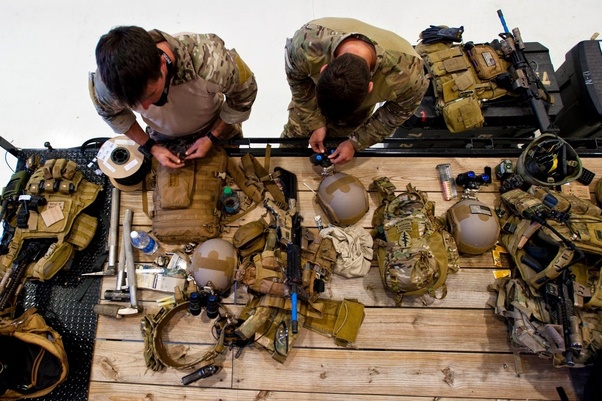
The Camp Lemonnier base was leased in 2001. The Combined Joint Task Force-Horn of Africa (CJTF-HOA) moved to Djibouti in 2003. In 2007, its expansion from 97 acres to around 500 acres was announced. In 2014, a 30-year lease with Djibouti was agreed, with $63 million in annual payments and in October 2018, $240 million was allocated to expand facilities. Around two-thirds of AFRICOM’s forces on the continent, around 4,000 troops, are stationed in the base.
The facility not only provides a facility for counterterrorism against groups in Africa but also functions as a counter to Chinese and Russian expansion in the region. Additionally, the base provides the U.S. with strategic benefits for air operations and closer strategic cooperation but also provides intelligence gathering benefits such as reconnaissance and surveillance.
Situated between the Red Sea and the Gulf of Aden, Djibouti is set to become a hub for international commerce. This attracts the strategic interests of international competitors: the U.S., France, Italy, Japan, and China all have operating military bases in Djibouti.
Chinese competition is the largest threat to AFRICOM’s viability in Djibouti: as Djibouti’s largest source of capital, Beijing is in an advantageous position. While avoiding all-out conflict, through hybrid warfare methods of economic and strategic maneuvering, China seeks to establish significant influence in the region. This aims to secure a strong sphere of influence in the Gulf and the Indian Ocean while limiting U.S. influence in the region.
U.S AFRICOM Presence
The U.S. has failed since 2008 to persuade any country on the continent to host AFRICOM. This means that Djibouti is vital for U.S. interests, i.e. counterterrorism and limiting Chinese/Russian influence in the region. There is a $31 million train-and-equip partnership between the U.S. and Djibouti military. The U.S. military’s payments amount annually to over $200 million directly or indirectly. This is equivalent to around 10 percent of Djibouti’s GDP. AFRICOM has an estimated $2 billion budget with calls to increase this in order to enhance its counterterrorism capabilities and better counter Chinese and Russian expansion.
Nevertheless, AFRICOM’s resources are stretched, limiting the growth of U.S. capabilities in Africa while China is investing heavily in the continent. A “zero-based review” of force posture has been ordered by Mark Esper on the continent to address the National Defense Strategy and counter Russia and China.
Flying a nuclear-capable B-52 over the Somali coastal town of Kismayo was a message to adversaries in the region. This is part of a U.S. B-52 build up in Diego Costa in the Indian Ocean, adding strategic geographic value to the Djibouti base as part of an Indian Ocean presence.
American military training is viewed as the “gold standard” among African nations. The U.S. can use this as an impetus for closer cooperation with Djibouti and neighboring countries that could aid in the increase of trade and cooperation.
Esper is a part of ongoing reviews of rebalancing troops. He has hinted that the U.S. may increase force posture in areas addressing great power competition while focusing less on CT ops. In this context, it is likely that AFRICOM presence may see a transfer to Djibouti. General Townsend, commander of AFRICOM, indicated China and Russia are in a position of advantage in central and southern Africa. Yet, U.S. Defense Secretary Mark Esper is reviewing the reduction of U.S. presence in the continent.
Similar reductions in Djibouti will likely limit the U.S. position in the Horn of Africa. Military and trade cooperation, simultaneously with better alternative infrastructure and loans for Djibouti’s state-building will highly likely reduce Chinese and Russian influence.
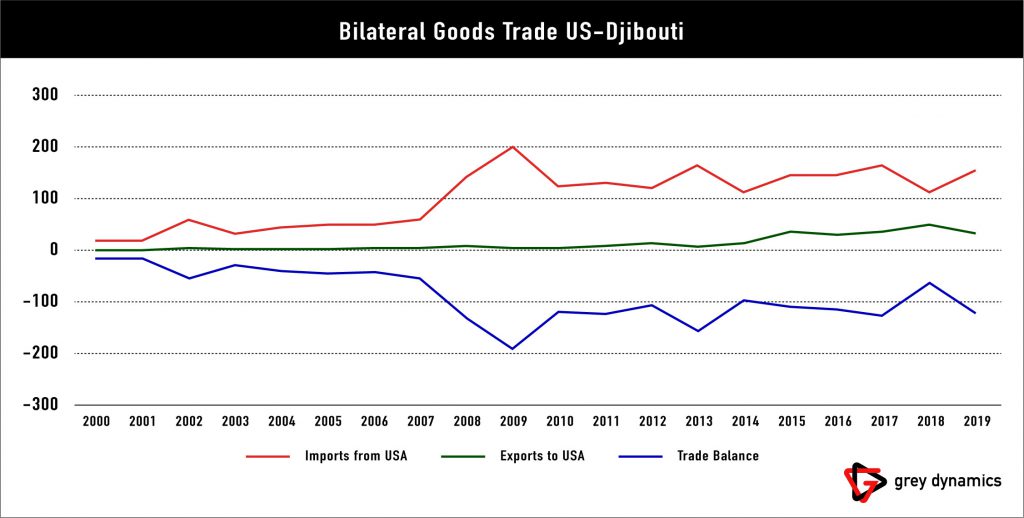
International Presence
1) A Chinese Expansion
China operates at an advantageous position in Djibouti because of deep economic ties and infrastructure projects. China is Djibouti’s largest source of capital and Chinese firms amount to almost 40 percent ($1.4 billion) of major investment projects in Djibouti. The infrastructure projects include the Djibouti-Ethiopia Railway project, Djibouti-Ethiopia Water pipeline, and most importantly the Dolareh port. The importance of the port not only boosts the Chinese Belt and Road initiative but also its military goals in the region. This also raises growing concerns that control of the port by Chinese authorities is threatening the existence of Camp Lemonnier.
The Dolareh Containment Terminal is critical for resupplying the base. Djibouti’s growing debt to China on unfavorable terms may likely facilitate China taking control of key facilities if payments are missed. For example, in Kenya, a $3.2 billion loan for the Nairobi rail line was under the conditions of the authority of the Mombasa port being collateral for defaulted payments, meaning defaults would result in Chinese firms managing the port to recover their capital. Already Chinese merchants operate their own terminal at the previous DP port.
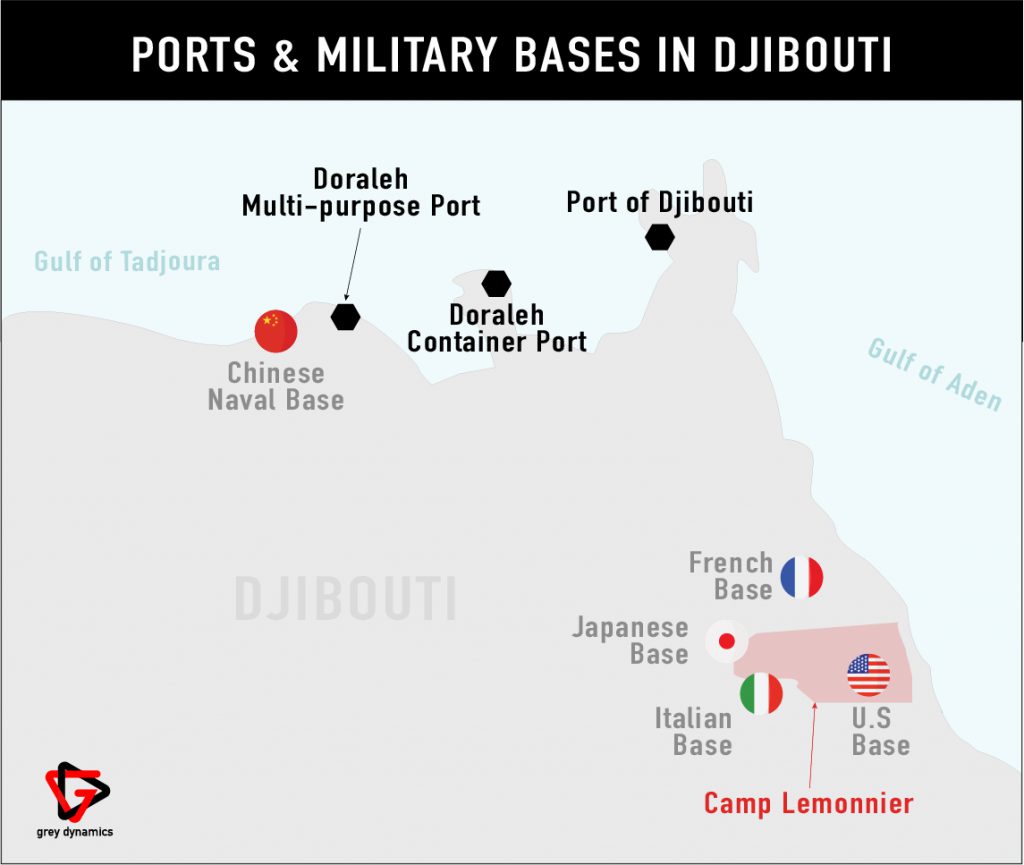
Chinese presence in the region provides intelligence collection on U.S. military applications and methods. This will likely limit the strategic benefits of U.S. presence in Djibouti and indicate threats to counterintelligence on U.S. Airforce operations in case of future conflict. There have been calls for China to use electromagnetic weapons, including lasers, to protect Chinese exploration interests. U.S. officials have acknowledged 20 occasions where lasers were used to target U.S. pilots thus interfering with operations.
An incident in 2018 near the base caused minor eye injuries to a U.S. pilot. While these are small probes, in February 2020, a Chinese destroyer used a “weapons-grade laser.” No crew was hurt or equipment damaged, but these tactics may create hesitation in future U.S. maneuvers near Chinese forces. An escalation of this form of warfare could limit the willingness of undertaking operations. The Defence Intelligence Agency assesses that China will be able to deploy ground-based lasers during this decade.
2) Japan and India Ties
Japan and India have both been present in anti-piracy operations in the Gulf of Aden. Japan has its own military base in Djibouti which China perceives as a threat to its Belt Road Initiative. China’s “String and Pearls” tactic aims to surround India with military and commercial facilities in order to achieve Indian Ocean Hegemony. Japan and India have been in close cooperation and an Acquisition and Cross-Servicing Agreement is likely. With Japan and India being partners of the U.S., an increase in tensions in Djibouti between China and Japan or India would highly likely bring the AFRICOM presence into play.
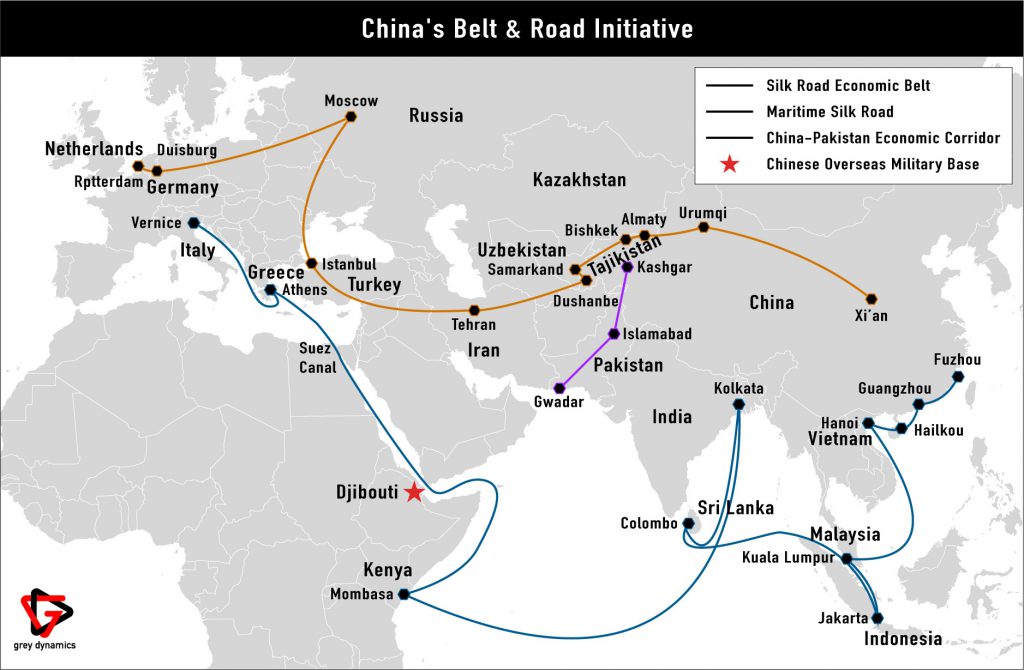
3) Russia and the Gulf States
Russia has been denied a military base in Djibouti under the context of Djibouti not seeking to become a battleground for a proxy war between competing nations. This is already becoming the case. Russia has a military footprint in Sudan and Eritrea. It seeks to establish Russian geopolitical spheres of influence in the region and looking to set up a base in Berbera, Somalia.
Saudi Arabia is also seeking to establish a base in Djibouti. Yet, it would face limitations in expanding its influence in the country due to Djibouti’s tensions with the U.A.E., a Saudi ally, over the previous militarisation attempt of the Dolareh port. The attempt resulted in Emirati troops being removed from the country.
4) NATO Presence
Italy and France both have military bases in Djibouti, providing regional support for AFRICOM. The partnership also boosts intelligence collection and sharing which benefits U.S. interests in the region. German and U.K. forces are also present. NATO forces strengthen AFRICOM’s presence. Simultaneously, a reduction of AFRICOM’s footprint would also inadvertently severely affect the capabilities of allies in the region. This would result in advantageous conditions for China and Russia.
Predictions
1) Chinese Hegemony Scenario
Considering current trends, it is a likely forecast that China will increase its strategic strength in Djibouti and undermine AFRICOM presence. This is based on the extent of existing economic and infrastructure ties and the high likelihood that these will intensify. It is also likely that the Chinese military maneuvering, to disrupt U.S. modus operandi in the Indian Ocean, will increase in the second half of the decade as China increases its military capacity.
Failure to increase AFRICOM funding or an actual decrease in funding will limit the strategic benefits of the U.S. base. Between 2008-2019 there has been an increase in imports from the U.S., but the trade balance is decreasing which may limit the perceived benefits of the U.S.-Djibouti partnership. Djibouti’s political inclination sides towards China, thus limiting U.S. partnership.
This scenario is possible as China avoids an all-out conflict with AFRICOM, which itself fails to embrace hybrid warfare to the same degree of success.
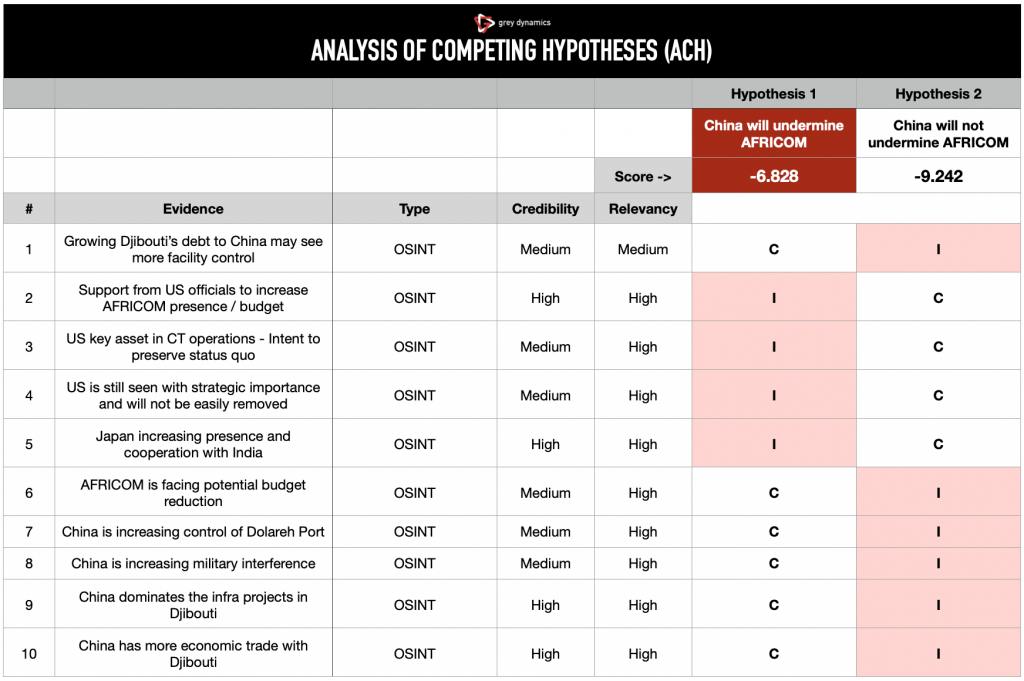
2) AFRICOM Surge Scenario
There is an even chance that U.S. strategic goals will consider the significance of AFRICOM’s presence in Djibouti and increase its budget and footprint. This will limit the growth of China if coupled with closer military cooperation and trade agreements. Investment and loans on more favorable terms will entice future cooperation with other African nations while limiting Chinese and Russian expansion. This would strengthen U.S. interests while to a degree, containing Chinese and Russian ones. Investment and loans on more favorable terms will entice future African nation cooperation.
3) Worst Case Scenario
Conflicting interests and lack of dialogue between the U.S. and competing nations escalate and an incident, such as laser targeting, causes an international crisis. Conflict in the region has instability reverberations on a wide scale and existing military assets suffer heavy casualties. A South China Sea crisis would likely impact the stability in the Indian Ocean, raising the likelihood of conflict for AFRICOM.
This is a highly unlikely but not impossible scenario.
Considerations
It is likely that some aspects will materialize in the mentioned scenarios to a degree while some will not. AFRICOM is likely under an existential threat by the end of the time scale provided. This is more likely not to be through military force but strategic maneuvering from China if current issues are not addressed.

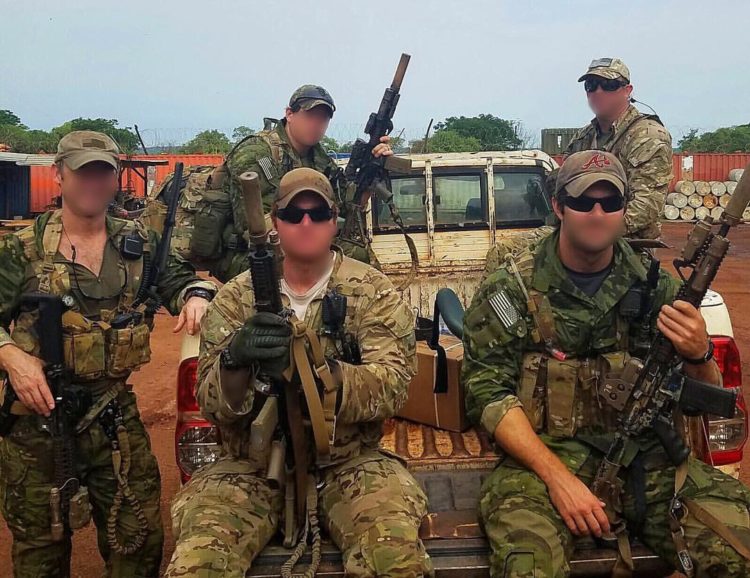








COMMENTS